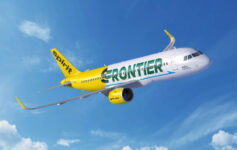Although he wrote it in January, the Philadelphia Inquirer just published a column our friend Christopher Elliott did on airline fees in this week’s Sunday travel section.
Some of his analysis is spot-on, much of it is…not.
First, what makes airline fees reasonable? According to Elliott:
1. They’re Optional
Everyone uses a credit card, so a “convenience” fee to pay with plastic isn’t a true choice. Neither is a fee for the first bag, because at a time when the TSA has banned toothpaste and hair gel in reasonable sizes from all carry-ons, almost everyone checks a bag.
I’m with Elliott on Allegient and Spirit Airlines’ ridiculous “credit card convenience” fee. Give me a break: we don’t go to an airline city ticket office and pay with cash or check anymore. But unlike Elliott, I don’t see a problem with baggage fees. $15-25 seems reasonable to me to check a bag and better to be charged only if you need it, than have it included in the ticket price. It is true that the TSA’s restrictions make traveling with only carry-on items difficult, but that is a TSA problem and not an airline problem.
2. They don’t charge for something that used to be free
The best fees add something instead of taking away. For example, after 9/11 many airlines upgraded their in-flight menus and then began charging for food. Almost no one complained, because airlines had already done away with in-flight meals on most domestic flights. Taking a bag of pretzels that used to be free and charging for it would have been the wrong move.
No argument here. As we just saw with Continental, it does not make economic sense to continue to offer free meals when you can offer fresh items for purchase that result in happier customers and increased profit.
3. They add value
JetBlue does this well. Whether it’s pillows or movies, the airline seems to know that adding to the product is the best way to do fees — not by removing amenities and services.
Another good point. Fees for enhanced features like DirectTV or Wi-Fi are reasonable because they add to the in-flight experience, making a five-hour transcon a valuable time to get work done for only a small fee.
Economy Plus on United is another example of a great value-added fee. You get the restricted legroom you pay for, but you can “upgrade” for only a small fee and have a much more bearable in-flight experience.
4. They’re reasonable
Charging a $150 change fee on a $49 ticket is completely unreasonable. A change fee should be a percentage of the ticket. Or better yet, there shouldn’t be one at all. I mean, how much does it really cost to change the date on a ticket?
I strongly disagree with Elliot here. While I’d love to have no change fees on all the deeply-discounted United tickets I buy, there is a reason why they are deeply-discounted. In exchange for the lower ticket price, I give up my right to make changes to the ticket. There is a way to avoid that $150 change fee that Elliott bemoans: buy a $500 refundable ticket instead of a $49 L-fare. I’ll stick to the L-fares.
Elliott goes on to discuss the specifics of fees. I’ll only comment on some of his observations.
1. In-Flight Wireless
2. Sections with more legroom
3. Elite Treatment
4. Seat andreservation fees
I’ve already touched on these ugly surcharges. Permit me to beat the horse until it’s dead: Schemes that defraud passengers of $15 to sit in a more desirable economy class seat, or that force them to pay for a confirmed reservation, are utterly wrong.
Laura Wilcox, an event planner in Orlando, paid $15 for a window seat on a recent Delta Air Lines flight from Detroit to Orlando. “But when I got on the plane my seat was filled because another passenger was displaced — people go crazy to sit together as families on the Orlando flights,” she says. The airline never returned her $15.
These seat fees aren’t right because you’re paying for something twice: once for the ticket, once for the seat reservation. Aren’t they one and the same?
What is he talking about? What is unreasonable about giving passengers the option to pay for a better seat? An airline ticket is a contract for transport from point A to point B, not for a particular seat. Southwest Airlines solves the problem nicely by not even assigning seats, but to respond to Elliott’s question, no–a reservation and seat assignment are not the same. You are entitled to a seat in your ticketed cabin when you purchase an airline ticket, not a particular seat.
5. Convenience Fees
6. Luggage fees and other non-sense surcharges
You know a silly fee when you see one. Unfortunately, most airlines don’t.
Sharon Strelzer, a marketing manager from Fairfield, Conn., says the recent moves to start charging for the first checked bag are just impractical, given the TSA’s liquid and gel limits. She also considers seat reservation fees to be out of line, and I’ve spoken with others who would include charges for soft drinks, and especially for potable water. “The airlines should raise the rates $50 or so and be done with the nonsense fees,” she says.
Actually, not a bad idea. But carriers know that nothing sells seats like a low fare, so they’re not going for it. Until they do, these absurd surcharges will probably keep popping up everywhere.
What an absurd conclusion! Why should I have to subsidize the checked bags of others? If airline raised ticket prices by $50 but included all the goodies like free checked bags and snacks, guess where most people would book? The airline that was cheaper–even if they end up spending the $50 for checked bags and snacks later on. It’s the economics of leisure travel.
Then this doozy:
Jim Goyjer, a Los Angeles-base marketing consultant and experienced air traveler, believes more drastic actions are needed. “Since deregulation of the airlines, service and quality have suffered,” he told me. On his preferred carrier, American Airlines, “almost all” of the seasoned cabin crew don’t like the company anymore. They blame top executives for mismanagement and greed, he told me. “They hate nickel and diming the passengers,” he added. “They feel more like vendors and waiters and waitresses than professionals.”
“We need to re-regulate the airlines,” he says.
Now there’s an idea.
Wow. In some ways I miss the days of regulation. No more chateaubriand on TWA between STL and LGA. No more happy employees proud to work for Pat Patterson. Cry me a river!
Morale is down. Employee wages are down. But so are fares! Does Elliott not realize that travel is dirt cheap today?
Take a look at this graphic:

photo courtesy: Duke University
The graphic nicely illustrates how technology and innovation leads to cheaper prices, but so does competition! $119 for a o/w transcon in 1945 was a tremendous improvement from two decades earlier, but was still ~$1,400 in 2010 dollars. How would you like to pay $2,800 for a r/t transcon fare today?
The results of deregulation have not always been pretty, but the good outweighs the bad. Fares are down 30%+ since 1979–leisure fares have fallen even further. That is something for consumers to rejoice about and makes stomaching the nickel and diming a little more bearable.
Bottom line, fees are profitable and they are here to stay:
If nothing else, fees are unbelievably profitable. The domestic airlines collected roughly $1 billion in ticket change fees and more than $1.2 billion in baggage fees during the first half of 2009, according to the government. American Airlines took in the most baggage fees — it raked in $226 million — while Delta Air Lines won in the change-fee category, collecting a cool $392 million.
Far better the profits come through optional fees than government-mandated ticket prices.




Leave a Reply